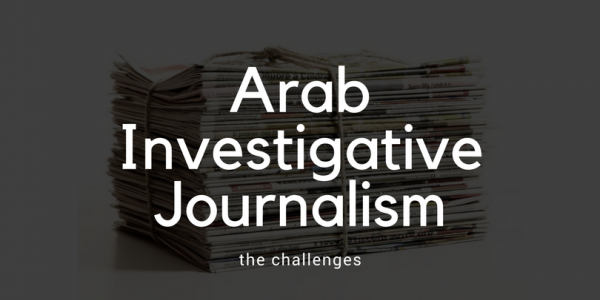
Read more
News
International Day to End Impunity for Crimes against Journalists 2017
The Centre for Media Pluralism and Media Freedom joins the campaign to end impunity and to ensure the safety and security of journalists and other media actors in performing their work. According to UNESCO, since 2006...
Investigative journalism is facing multiple challenges in addition to funding and political limitations across both the developed and developing world. Political and often social restrictions put journalists’ lives in danger. So when thinking of the Arab world, investigative journalism seems like a far fetched dream! Yet there seems to be a glimpse of hope for the establishment of an Arab culture of investigative journalism, despite some significant impediments.
In 2005 investigative journalism training was launched through the establishment of the Arab Reporters for Investigative Journalism (ARIJ) in Amman, Jordan as the first institutionalised investigative journalism training in the Arab world. Since the emergence of ARIJ, funding investigative reporting has been secured by donors. ARIJ was initially funded by the Danish Parliament through the International Media Support (IMS). Over the years, additional donors have funded ARIJ’s activities including the Foundation for Open Society, UNESCO, the Washington-based International Center for Journalism (ICFJ), and the Swedish International Development Cooperation Agency (SIDA.). Hence the issue of funding has not been a major concern in the Arab world as in western countries, however this seed funding is not guaranteed on the long run and will eventually become an issue if not addressed early on. In addition to these issues, which are experienced by journalists worldwide, there are a variety of challenges which are characteristic of Arab investigative reporting, which I will now discuss. It is necessary, however, to distinguish between each Arab country’s ‘culture of journalism’ as they differ depending on the nature of the country, however the challenges discussed here provide a general mapping of the region overall.
One obvious obstacle to the development of investigative journalism is that Arab states are generally authoritarian systems which practice state control. This undoubtedly makes the whole process of investigative reporting a challenging exercise. Although the Arab Spring has potentially offered changes to this, new leaderships that replaced old regimes have not necessarily opened up the media space. From what has been observed in Libya and Egypt, the state of media control in these countries have to some extent remained unchanged. Although investigative reporting has been made more possible through online platforms, which have also played a significant role in the Arab Spring overall, journalists are still operating under state control and regulations. Having said this, although at first instance it would be expected that state control is the main obstacle to the development of investigative journalism in the region, in fact this study has found that journalists were getting accustomed to state restrictions and had developed mechanisms to override it such as avoiding certain framing of politicians and issues, or publishing stories under pseudonyms. So, in essence, what this study found to be a major obstacle to journalists were in fact societal pressures as I shall later discuss in this paper.
The instability of the region continues to be a challenge which adds to the tension experienced by Arab reporters in general, where they feel that they are working in environments which Rana Sabbagh, who is the Executive Director of ARIJ, describes as ‘moving sands’ (Sabbagh, 16 June 2013). Revolutions could start anytime and when they happen, the practice of investigative reporting is frozen and all the progress in improving the state of investigative reporting comes to a halt, as in the case of Syria which witnessed an increase in published investigative stories up until the start of its political upheaval.
Another obstacle to investigative journalism in the Arab region is the issue of access to information. According to UNESCO, progress on freedom of information legislation has been slow in Arab states in comparison to other parts of the world. Jordan passed an FOI law in 2007 that has undergone a difficult implementation phase. In Tunisia, a decree law on freedom of information was enacted since 2011, following this Yemen passed an FOI law in 2012. In Morocco’s new constitution adopted in 2011, a provision in article 27 was included to secure access to public information (UNESCO, accessed 5th August 2013). According to Sabbagh, the issue in general regarding FOIs in Arab countries is that there are no clear policies and procedures, and the policies which are put in place are seen as ‘window dressing for donors’ (Sabbagh, 16 June 2013). In addition, journalists themselves prefer to get information through traditional paths such as buying information. She sees that Arab states do not grant themselves press freedom in broader terms, unless they are forced to do so by donors, thus making the whole process of media freedom a continuous challenge. (Sabbagh, 16 June 2013). Within the Arab context, most debates surrounding the right and access to information, in the development of policy frameworks, have centred on where the line can be drawn between the public’s right to know and government security. This includes the question of when government information can and cannot be disclosed. Many Arab states have been withholding information with the pretext that the information requested relates to the security of government, and therefore cannot be disclosed. In a region which is situated within high political tension and continuous conflicts, such a reply could be deemed legitimate and accordingly is used all the time by public bodies whether it applies or not.
In addition to state restrictions on investigative reporting, there are social pressures that journalists face which surprisingly is one of the biggest obstacles Arab reporters face. Although journalists working on investigative stories see themselves as uncovering the truth for the benefit of society and the people, there are instances where often investigative reporting uncovers truths that are too confronting for society itself. Society does not always see itself as comfortable with change, and in turn reacts by criticising investigative reports and journalists. Accordingly, journalists find themselves not only restricted by the state but also by society. With the slow rise of investigative reporting in Arab countries, journalists are being accused of destroying the country through their investigative pursuits, especially those who are trained by ARIJ which is often an organisation that is accused of being foreign-funded (Sabbagh, 16 June 2013). According to Sabbagh, society does not want to go through the painful analysis of what is wrong and what is right. Sabbagh points out that ‘there are so many social, religious, cultural taboos which are present everywhere in the world but are magnified in our area’ (Sabbagh, 16 June 2013). Social change, therefore, continues to be a main challenge for Arab investigative reporters.
One continuing challenge to the rise of Arab investigative journalism is the culture of journalism. Arab investigative reporting in the Arab world is relatively new despite there being various individual attempts in earlier times. Arab journalism has traditionally followed set formulas, and even set linguistic news expressions. One characteristic that is dominant in the culture of Arab journalism is that journalists have tended to traditionally play a steering role in the construction of the news message, dictating to audiences how to think and how to react to the events at hand. Jerichow, who is a board member ARIJ, states: ‘You get audiences who cannot think for themselves, they are told what to think, journalists have pre-empted ideas’ (Jerichow, 6 December 2014). The reason behind this journalistic role goes back to the news media being used as a political tool and a mouthpiece for the state. Hence, the concept of using a hypothesis-based process of investigating a story can be problematic for Arab journalists who are trained to report on pre-empted angles that provide a certain narrative to a story. Journalism in the Arab world has not been re-vamped or challenged to date. Daily reporting takes the role of massaging public opinion with the use of literary expressions that motivate and evoke emotions. Such journalistic practice feeds and breeds social norms, and fails to challenge, educate and liberalise social thought. For social change to occur however, journalists themselves need to be trained to challenge their culture of journalism that they have long practiced. Investigative journalism coaches who have been training young journalists have expressed that this change has not been easy. Training young journalists, for example, to base their reporting on facts and not emotional pre-selected opinions requires a different journalistic approach to covering a story. Other requirements for change include the need to pay attention to details and to be meticulous, which also requires new journalistic skills.
Nonetheless, according to Sabbagh this is a transitional stage, and although young journalists are slowly making this transition, their editors-in-chef do not seem to accept this change (Sabbagh, 16 June 2013). Young journalists who have undergone investigative journalism training tend to report back complaining of how their editors do not support them and do not appreciate that often investigative reporters need to be left alone in order to produce a good investigative story. Young journalists end up having to do both the daily reporting and investigative reporting, so a story that takes six months could end up taking two to three years; progress is therefore slow and constrained (Sabbagh, 16 June 2013). Hence another obstacle for the development of investigative reporting is journalism education. Most Arab journalists, according to Sabbagh, are products of schools and universities that do not encourage critical thinking (Sabbagh, 16 June 2013). Sabbagh states that the journalism curriculum teaches theory that stems from the 1950s and 1960s. University journalism students graduate without understanding how investigative journalism is different from daily news reporting. Education is the future for the development of Arab investigative journalism as it serves to build a new generation of investigative reporters who will challenge traditional forms of reporting and hopefully address current obstacles to investigative journalism.
References
Jerichow, Anders (2014) ARIJ Board Member, Interview with Author, Amman, Jordan, 6th December 2014
Sabbagh, Rana (2013) Executive Director of Arab Reporters for Investigative Journalism, Interview with Author, Amman, Jordan, 16th June 2013
UNESCO, Freedom of Information, https://www.unesco.org/new/en/communication-and-information/freedom-of-expression/freedom-of-information/, accessed 5 August 2014


